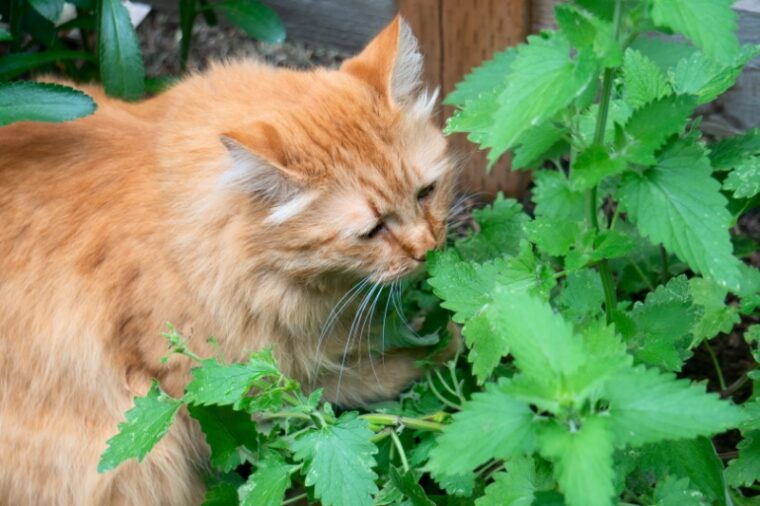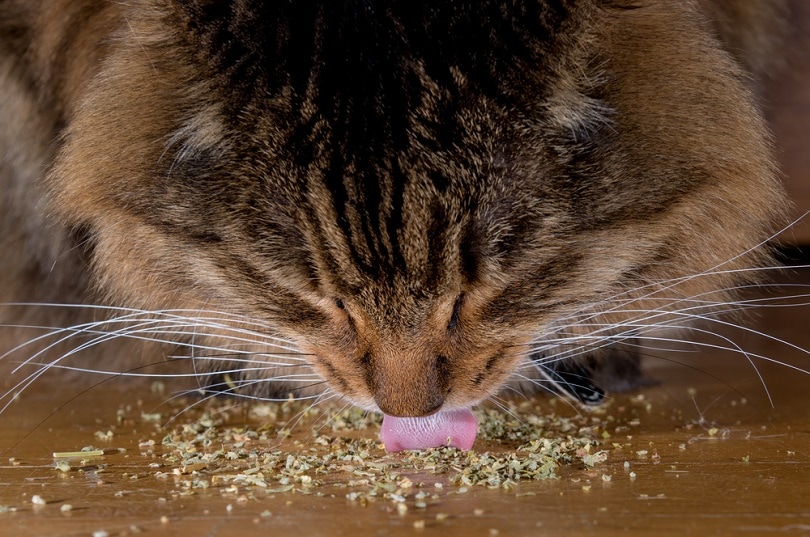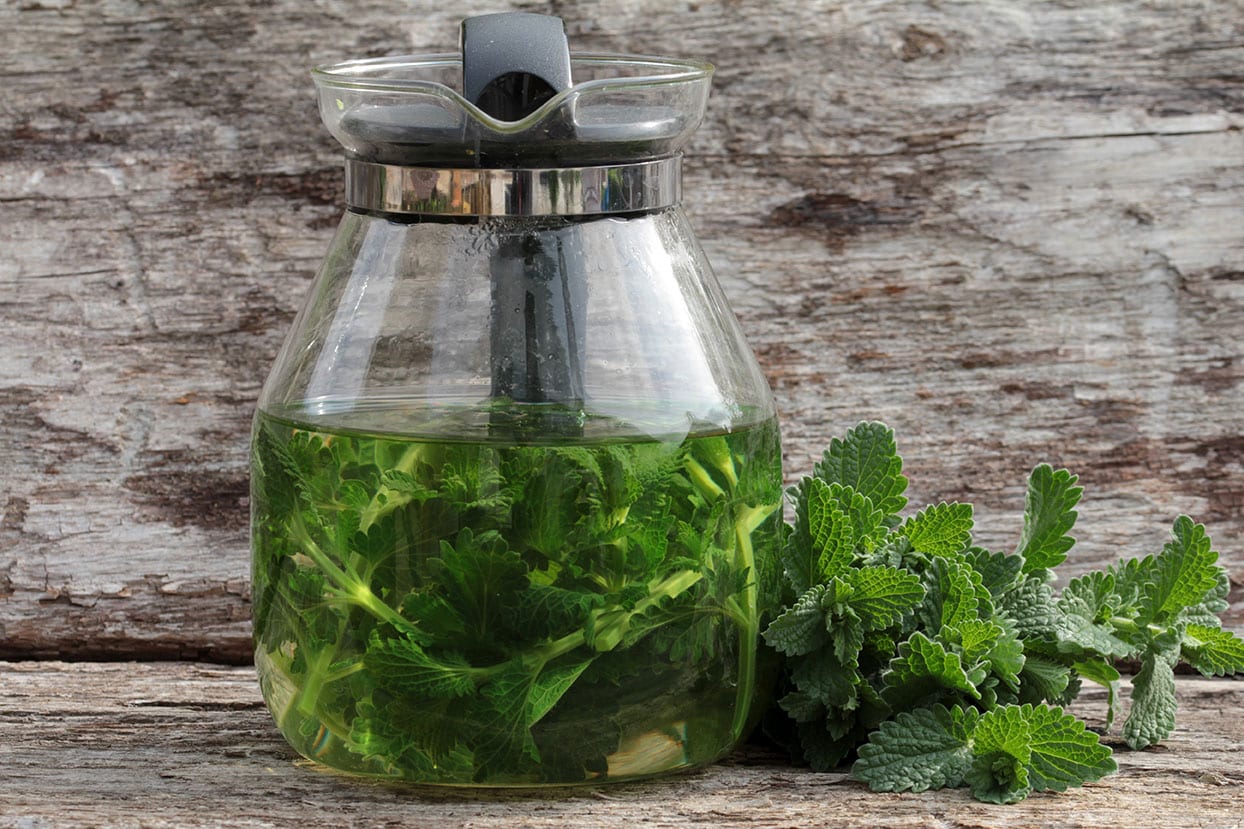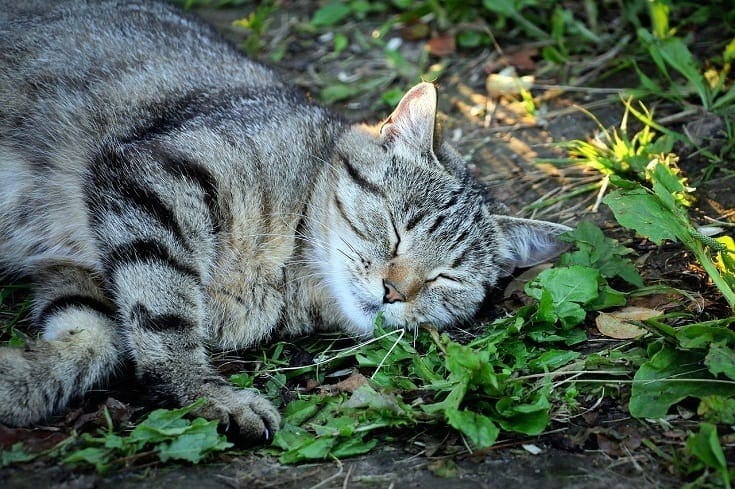
As a cat lover, you’re probably familiar with the effects of catnip. Also referred to as catswort and catmint, catnip is native to Asia, North Africa, and Europe. Currently, the herb is cultivated in Europe, North America, and New Zealand. A feline’s response to catnip is hereditary, and only around 70% of cats experience a high or calming effect from catnip. The reaction to catnip can vary, but the most common signs include purring, rolling around on the floor, drooling, and sleeping. The chemical nepetalactone is the active ingredient in catnip that causes an enthusiastic reaction in felines.
Watching your kitty become transformed from the dried herb is undoubtedly entertaining, but does catnip have any benefits for your cat? Yes, you’ll be happy to know that catnip can benefit your cat’s mental and physical health.
The 8 Benefits of Catnip for Cats
1. Catnip Encourages Playtime
Due to the dangers of predatory wildlife and speeding automobiles, outdoor cats tend to have shorter lifespans than indoor felines. But while indoor cats can live long, comfortable lives, they’re not always as physically fit as outdoor cats. If an indoor cat does not receive the correct diet and exercise, they can become listless and obese. Offering catnip to a lazy cat can transform their behavior and encourage them to engage in playtime.
After collecting your cat’s toys, sprinkle some catnip in a small bowl, and place it in front of your cat. When you notice the cat’s behavior change, use your wands, stuffed mice, or other toys to lead your cat in a spirited play session. The effects of the catnip can last up to 10 minutes or more, but you’ll have to wait at least 30 minutes after the first exposure to try again. Catnip can have an invigorating effect on your cat and help them increase their physical fitness.
Catnip can really enrich your cat's life, especially if you choose a fun, well-built catnip toy. Our favorite option is Hepper's Catnip Stick Toy, which offers sturdy construction, 100% organic catnip fill, and a great range of colors. These toys are handmade in the USA and feature bite-proof double bagging.
At Pet Keen, we've admired Hepper for many years, and decided to take a controlling ownership interest so that we could benefit from the outstanding designs of this cool cat company!
2. Catnip Satisfies Distracted Felines
Unlike dogs, some cats seem aloof and less concerned about engaging with humans around the home. However, even a timid or stubborn kitty needs attention and love. A distracted or bored cat will find a way to entertain themselves if you’re unavailable. Unfortunately, a neglected cat can take out their aggression on your belongings or furniture.
Sprinkling catnip on scratching posts, cat trees, and toys can direct your cat’s destruction away from your valuable property. Certain surfaces, like vertical scratching posts, aren’t ideal for dried catnip applications, but you can purchase a catnip spray instead.
3. Catnip Can Help With Training
Convincing your cat to enter their carrier for a vet appointment can test your patience and force you to chase your cat around the house. Cats are intelligent, and they associate the carrier with their previous uncomfortable experience at the doctor’s office. The night before your cat’s appointment, you can drag the carrier out of storage and place it by the animal’s toys or resting area. Sprinkle catnip on the interior and exterior of the carrier to convince the feline that the container is nothing to be fearful of.
You can also use catnip as a reward when they visit a vet. Cats, like most creatures, are not fond of needles or vaccinations. After the doctor inoculates your kitty, give them an edible catnip treat or provide a catnip toy to ease their anxiety and reward them for exceptional behavior.

4. Catnip Can Calm Your Cat and Ease Stress
When cats sniff catnip, they become excited and playful. However, the herb produces a sedative effect when cats eat it, and some will happily take a nap after eating a small portion of the herb. The calming effect is especially helpful for cats with anxiety problems and ones that have recently moved to a new home.
Moving your cat to a new address can be a traumatic experience for the poor kitty, and as you probably know, cats are not fond of change. Your cat can spend days or even weeks exploring the strange place, crying excessively, and ignoring the food bowl. To prevent a lengthy adjustment period, you can use catnip to calm your unhappy feline. Spray or sprinkle catnip on some of their bedding, toys, and scratching posts to ease their anxiety.
5. Catnip Can Make Bath Time More Enjoyable
Bathing your feline is probably not your favorite thing to do. Although some cats stay relatively motionless while you scrub their coats, others resemble the Tasmanian Devil trapped in a washing machine. Your arms can become covered with scratches and bite marks from the animal’s frenzied attacks, but you can minimize the chaos by adding catnip to the bathwater.
While warm bath water will not be hot enough for the catnip to steep, you can make catnip tea by adding 1 teaspoon of dried catnip to a boiling cup of water. When it cools down after a few minutes, add the liquid to the bathwater. The aroma will calm the anxious animal, and it can also soothe the cat’s dry skin. However, bathing your feline should not be a frequent activity. You should only wash your cat when they’re dirty from outside play or infested with insects. Washing the cat’s coat too much can deplete essential oils and lead to dry, unhealthy skin.

6. Catnip Has Medicinal Benefits
In Asia, catnip has been used for several years to treat minor medical conditions like scrapes, bruises, and arthritis in humans. It can also be applied to your cat’s minor cuts to accelerate heating. You can create a medicinal paste by grinding the leaves and stems from catnip and adding a few tablespoons of water (you’re looking for the same consistency and texture as basil pesto).
You can use a mortar and pestle to make the paste or try a food processor. Add 1 cup of fresh catnip stalks (leaves and stems) to the processor, and blend for 10 seconds. Add water in small increments until the paste resembles pesto. You can apply the paste to the cat’s cuts to promote healing, but deep cuts or punctures should be treated by a veterinarian.
7. Catnip Can Improve Sleeping Habits
Cats with insomnia or other sleeping disorders can benefit from the sedative properties of catnip. Provide your cat with a small bowl of dried catnip or a catnip treat before bedtime to help them doze off faster. Prescription sleeping pills are available, but some have uncomfortable side effects. Catnip is a natural sleep aid, and it can be safer to use regularly than prescription medications. Vomiting and diarrhea are possible side effects of catnip, but they typically occur when the cat has ingested too much.

8. Catnip Can Repel Mosquitos
Mosquitos are notorious carriers of infectious diseases, and keeping them away from your furry friend is crucial to their health. Although there’s evidence that catnip has been used for centuries as a pest repellent, few studies have been conducted to assess the herb’s effectiveness. Recently, a study by Lund University and Northwestern University has confirmed that catnip can indeed keep mosquitos away.
So, if your cat plays outside on the patio or deck, you can arrange pots of fresh catnip around the perimeter to reduce the mosquito population. A few 1- or 2-gallon pots, potting soil, and healthy catnip seedlings are all that you need to set up an effective mosquito barrier.
- Related Read: Why Do Cats Love to Roll Around in Catnip?
Other Considerations
Although catnip is harmless to cats, some felines can overdo it and ingest too much. Cats that consume too much can experience diarrhea and vomiting, but luckily, it’s a temporary condition that does not endanger their health.
You can find catnip at pet stores and online merchants, and while most companies package catnip as a dried herb, you can also purchase fresh catnip or grow it in your home garden. Providing fresh catnip from the garden to your feline can brighten their day, but be careful where you plant the herb. Since it’s related to mint, it grows quickly and can be invasive.
Conclusion
Although researchers have identified the reactive agent nepetalactone as the trigger for cats’ unusual response to catnip, the behavior that cats exhibit after sniffing or eating catnip is still not entirely understood. Some feline researchers compare the reaction to a female cat in heat, and some cat owners suggest that catnip increases aggression in male cats. More research needs to be conducted on catnip, but we know that the harmless herb can benefit your cat’s life in many ways.
Since a small percentage of cats are oblivious to the herb’s effects, some felines may only benefit from catnip as a wound treatment. If you have a kitten, the cat must be at least 6 months old before they have a reaction to the herb. From reducing stress, repelling insects, improving training, and treating wounds, catnip is a multi-use plant that can keep your feline healthy and happy.
- You may also want to read: Catnip Tea for Cats: How to Make It, Benefits, Recipes & More
Featured Image Credit by: Badon Hill Studio, Shutterstock








